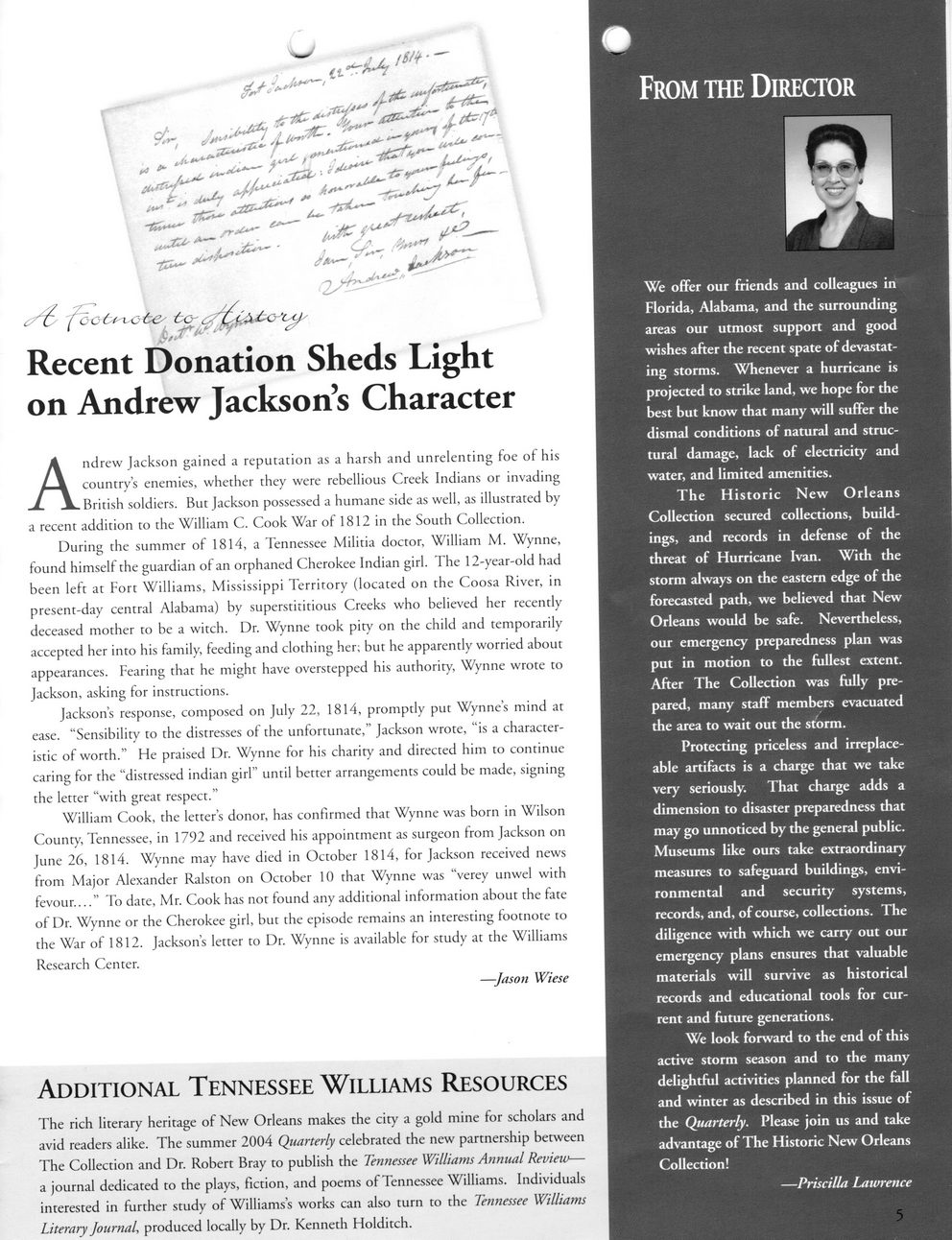This text was obtained via automated optical character recognition.
It has not been edited and may therefore contain several errors.
From the Director |?1 We offer our friends and colleagues in Florida, Alabama, and the surrounding areas our utmost support and good wishes after the recent spate of devastating storms. Whenever a hurricane is projected to strike land, we hope for the best but know that many will suffer the dismal conditions of natural and structural damage, lack of electricity and water, and limited amenities. The Historic New Orleans Collection secured collections, buildings, and records in defense of the threat of Hurricane Ivan. With the storm always on the eastern edge of the forecasted path, we believed that New Orleans would be safe. Nevertheless, our emergency preparedness plan was put in motion to the fullest extent. After The Collection was fully prepared, many staff members evacuated the area to wait out the storm. Protecting priceless and irreplaceable artifacts is a charge that we take very seriously. That charge adds a dimension to disaster preparedness that may go unnoticed by the general public. Museums like ours take extraordinary measures to safeguard buildings, environmental and security systems, records, and, of course, collections. The diligence with which we carry out our emergency plans ensures that valuable materials will survive as historical records and educational tools for current and future generations. We look forward to the end of this active storm season and to the many delightful activities planned for the fall and winter as described in this issue of the Quarterly. Please join us and take advantage of The Historic New Orleans Collection! ?Priscilla st. Recent Donation Sheds Light on Andrew Jackson?s Character Andrew Jackson gained a reputation as a harsh and unrelenting foe of his country?s enemies, whether they were rebellious Creek Indians or invading British soldiers. But Jackson possessed a humane side as well, as illustrated by a recent addition to the William C. Cook War of 1812 in the South Collection. During the summer of 1814, a Tennessee Militia doctor, William M. Wynne, found himself the guardian of an orphaned Cherokee Indian girl. The 12-year-old had been left at Fort Williams, Mississippi Territory (located on the Coosa River, in present-day central Alabama) by superstititious Creeks who believed her recently deceased mother to be a witch. Dr. Wynne took pity on the child and temporarily accepted her into his family, feeding and clothing her; but he apparently worried about appearances. Fearing that he might have overstepped his authority, Wynne wrote to Jackson, asking for instructions. Jackson?s response, composed on July 22, 1814, promptly put Wynne?s mind at ease. ?Sensibility to the distresses of the unfortunate,? Jackson wrote, ?is a characteristic of worth.? He praised Dr. Wynne for his charity and directed him to continue caring for the ?distressed indian girl? until better arrangements could be made, signing the letter ?with great respect.? William Cook, the letter?s donor, has confirmed that Wynne was born in Wilson County, Tennessee, in 1792 and received his appointment as surgeon from Jackson on June 26, 1814. Wynne may have died in October 1814, for Jackson received news from Major Alexander Ralston on October 10 that Wynne was ?verey unwel with fevour....? To date, Mr. Cook has not found any additional information about the fate of Dr. Wynne or the Cherokee girl, but the episode remains an interesting footnote to the War of 1812. Jackson?s letter to Dr. Wynne is available for study at the Williams Research Center. ?Jason Wiese Additional Tennessee Williams Resources The rich literary heritage of New Orleans makes the city a gold mine for scholars and avid readers alike. The summer 2004 Quarterly celebrated the new partnership between The Collection and Dr. Robert Bray to publish the Tennessee Williams Annual Review? a journal dedicated to the plays, fiction, and poems of Tennessee Williams. Individuals interested in further study of Williams?s works can also turn to the Tennessee Williams Literary Journal, produced locally by Dr. Kenneth Holditch.

Battle of 1814 Character